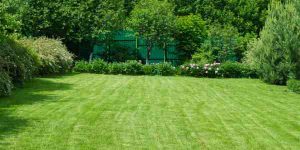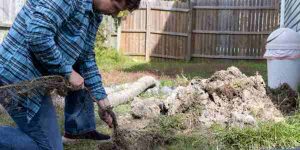Fall Plant Diseases

Fall Plant Diseases and How to Prevent Them
As the leaves change and autumn paints your landscape with warm hues, it’s easy to believe that your garden is safe from the pests and diseases that can plague it during the warmer months. However, fall is not immune to plant diseases, and being proactive in safeguarding your garden is essential to keeping it healthy and thriving. At Impact Landscapes, we understand the importance of maintaining the beauty of your outdoor oasis year-round. In this blog, we’ll explore some common fall plant diseases and offer expert tips on how to prevent and manage them.
Common Fall Plant Diseases
Powdery Mildew: Powdery mildew is a common fungal disease that affects a wide range of plants, including roses, lilacs, and vegetables. It appears as a white, powdery substance on leaves and can cause them to wither and die.
Leaf Spot: Leaf spot diseases, caused by various fungi and bacteria, can result in dark spots on leaves, leading to reduced photosynthesis and overall plant health. Plants like tomatoes and dogwoods are susceptible.
Rust: Rust diseases manifest as rusty or orange-colored pustules on the undersides of leaves. They often target plants like roses, hollyhocks, and various trees, leading to leaf discoloration and early leaf drop.
Blight: Late blight, common in cooler, wetter fall weather, can devastate tomatoes and potatoes. It causes dark, irregular spots on leaves, leading to fruit rot and plant decline.
Prevention Strategies
Preventing fall plant diseases is the key to a vibrant garden. Here are some strategies and tips to keep your garden disease-free:
- Select Disease-Resistant Plants: Start with disease-resistant plant varieties when designing your garden. These plants are less susceptible to common diseases and can be a valuable addition to your landscape.
- Proper Plant Spacing: Adequate spacing between plants ensures proper airflow, reducing the chances of disease spread. Impact Landscapes can assist in planning and planting your garden for optimal spacing.
- Watering Practices: Water your plants at the base and avoid overhead watering, which can spread fungal spores. Use a soaker hose or drip irrigation to keep foliage dry.
- Morning Watering: Water your garden in the morning to allow excess moisture to evaporate during the day, reducing humidity levels that promote disease growth.
- Healthy Soil: Maintain healthy soil by regularly amending it with organic matter. Healthy soil leads to healthy plants that are more resilient to disease.
- Pruning and Trimming: Regularly prune and trim your plants to remove dead or diseased foliage. Dispose of infected plant material to prevent further spread.
- Clean Tools: Keep your gardening tools clean and disinfected. Dirty tools can transmit disease from one plant to another.
- Mulching: A layer of mulch can prevent soil-borne diseases from splashing onto plant leaves during rain or irrigation.
- Fertilize Appropriately: Over-fertilization can weaken plants, making them more susceptible to disease. Follow recommended fertilization guidelines.
Recognizing and Managing Plant Diseases
Despite your best efforts, your garden may still face disease challenges. Early detection and prompt action are crucial to managing these issues:
- Regular Inspection: Routinely inspect your plants for signs of disease, such as discolored or spotted leaves, wilting, or unusual growth patterns.
- Isolate Affected Plants: If you discover a diseased plant, isolate it from healthy ones to prevent the disease from spreading.
- Prune and Remove Affected Parts: Trim and remove infected leaves or branches as soon as you notice them. Dispose of the removed material properly.
- Fungicides: In severe cases, fungicides may be necessary to control the spread of disease. Consult with Impact Landscapes for recommendations on safe and effective treatments.
- Seek Professional Help: If you’re unsure about how to handle a plant disease issue or if it’s widespread, don’t hesitate to seek professional help. Impact Landscapes offers expert disease management services to protect your garden.
Trust Impact Landscapes for Your Garden’s Health
At Impact Landscapes, we’re dedicated to helping you maintain a vibrant and disease-free garden, even during the fall season. Our team of experienced professionals can assist you in selecting disease-resistant plants, implementing preventive measures, and managing plant diseases effectively. We understand that your garden is your sanctuary, and we’re here to ensure it thrives year-round.
This fall, don’t let plant diseases mar the beauty of your outdoor oasis. Contact Impact Landscapes today to schedule a consultation and learn how our services can protect and enhance your garden. With our expertise and commitment to excellence, you can enjoy a stunning and disease-free garden throughout the autumn season and beyond.



